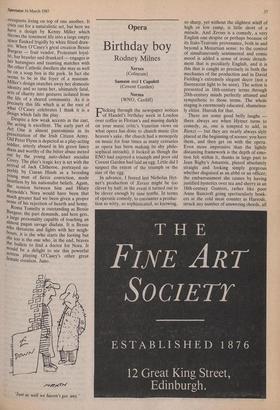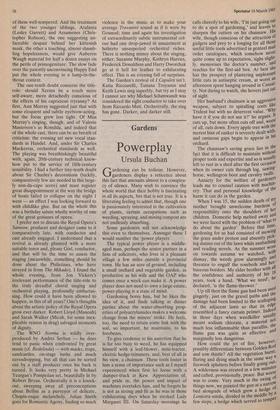Opera
Birthday boy
Rodney Milnes
Xerxes (Coliseum) Norma (WNO, Cardiff) Ulicking through the newspaper notices of Handel's birthday week in London over coffee in Florian's and musing darkly on your music critic's Venetian views on what opera has done to church music (for heaven's sake, the church had a monopoly on music for four times as many centuries as opera has been making its .shy philo- sophical inroads), it looked as though the ENO had enjoyed a triumph and poor old Covent Garden had laid an egg. Little did I suspect the extent of the triumph or the size of the egg.
In advance, I feared lest Nicholas Hyt- ner's production of Xerxes might be too clever by half; in the event it turned out to be clever enough by nine tenths. In terms of operatic comedy, to encounter a produc- tion so witty, so sophisticated, so knowing, so sharp, yet without the slightest whiff of high or low camp, is little short of a miracle. And Xerxes is a comedy, a very English one despite or perhaps because of its Italo-Teutonic provenance, both in and beyond a Mozartian sense: to the control of simultaneously sentimental and comic mood is added a sense of ironic detach- ment that is peculiarly English, and it is this that is caught so precisely in both the mechanics of the production and in David Fielding's extremely elegant decor (not a fluorescent light to be seen). The action is presented in 18th-century terms through 20th-century minds perfectly attuned and sympathetic to those terms. The whole staging is enormously educated, shameless- ly elitist. Hurrah for that.
There are some good belly laughs — there always are when Hytner turns to comedy, as, one is tempted to add, in Rienzi — but they are nearly always slyly placed at the beginning of scenes: you have them, and then get on with the opera. Even more impressive than the lightly distancing framework is the depth of emo- tion felt within it, thanks in large part to Jean Rigby's Amastris, played absolutely straight and looking simply gorgeous whether disguised as an abbe or an officer; the embarrassment she causes by having justified hysterics over tea and sherry in an 18th-century Gunters, rather like poor Anne Bancroft going spectacularly bonk- ers at the 'cold meat counter in Harrods, struck any number of answering chords, all
of them well-tempered. And the treatment of the two younger siblings, Atalanta (Lesley Garrett) and Arsamenes (Chris- topher Robson), • the one suggesting un- faceable despair behind her kittenish mask, the other a touching, almost shamb- ling hopelessness, would give Auberon Waugh material for half a dozen essays on the perils of primogeniture. The slow fade over the patently unconvincing Happy End put the whole evening in a lump-in-the- throat context.
The one-tenth doubt concerns the title- role: should Xerxes be a touch more self-aware, more detachedly conscious of the effects of his capricious tryranny? At first, Ann Murray suggested just that with some eloquent and subtle eyebrow-acting, but the focus grew less tight. Of Miss Murray's singing, though, and of Valerie Masterson's as Romilda, and indeed that of the whole cast, there can be no breath of criticism: the evening set new vocal stan- dards in Handel. And, under Sir Charles Mackerras, orchestral standards as well. The playing was breathtakingly beautiful with, again, 20th-century technical know- how put to the service of 18th-century sensibility. I had a further tiny-tenth doubt about Sir Charles's decorations (luckily, comparatively few are needed in this large- ly non-da-capo score) and must register great disappointment at the way the bridge of boats failed to collapse on the night I went — an effect I was looking forward to with childlike glee. But on the whole this was a birthday salute wholly worthy of one of the great geniuses of opera.
I prefer not to discuss the Royal Opera's Samson; producer and designer came to it comparatively late, with conductor and cast already engaged. I understand that a revival is already planned with a more suitable tenor and, please God, conductor, and that will be the time to assess the staging (meanwhile, something should be done about the Philistines, who have strayed in from The Mikado). I found the whole evening, from Jon Vickers's irrelevant performance of the title-role to the truly dreadful choral singing and orchestral playing, profoundly embarras- sing. How could it have been allowed to happen, in this of all years? One's thoughts about the artistic policy of the Royal Opera grow ever darker. Robert Lloyd (Manoah) and Sarah Walker (Micah, for some inex- plicable reason in drag) salvaged moments of dignity.
The WNO Norma is wildly over- produced by Andrei Serban — he does tend to panic when confronted by great music (cf. Rodelinda)— with masks, traps, sandcastles, on-stage baths and much eavesdropping, but all that can be sorted out by a staff producer once his back is turned. It looks very pretty in Michael Yeargan's Pompeiian set, beautifully lit by Robert Bryan. Orchestrally it is a knock- out, sweeping away all preconceptions about Bellini as a purveyor of delicate, Chopin-esque melancholy. Julian Smith goes for Romantic Agony, finding so much violence in the music as to make your average Trovatore sound as if it were by Gounod; time and again his investigation of extraordinarily subtle instrumental col- our had one drop-jawed in amazement at hitherto unsuspected orchestral riches. There is nothing mimsy about the singing, either: Suzanne Murphy, Kathryn Harries, Frederick Donaldson and Harry Dworchak go at it hell for leather to exhilarating effect. This is an evening full of surprises.
The Garden's revival of 1 Capuleti isn't. Katia Ricciarelli, Tatiana Troyanos and Keith Lewis sing superbly, but try as I may I cannot see why Michael Schonwandt was considered the right conductor to take over from Riccardo Muti. Orchestrally, the zing has gone. Darker, and darker still.



















































 Previous page
Previous page